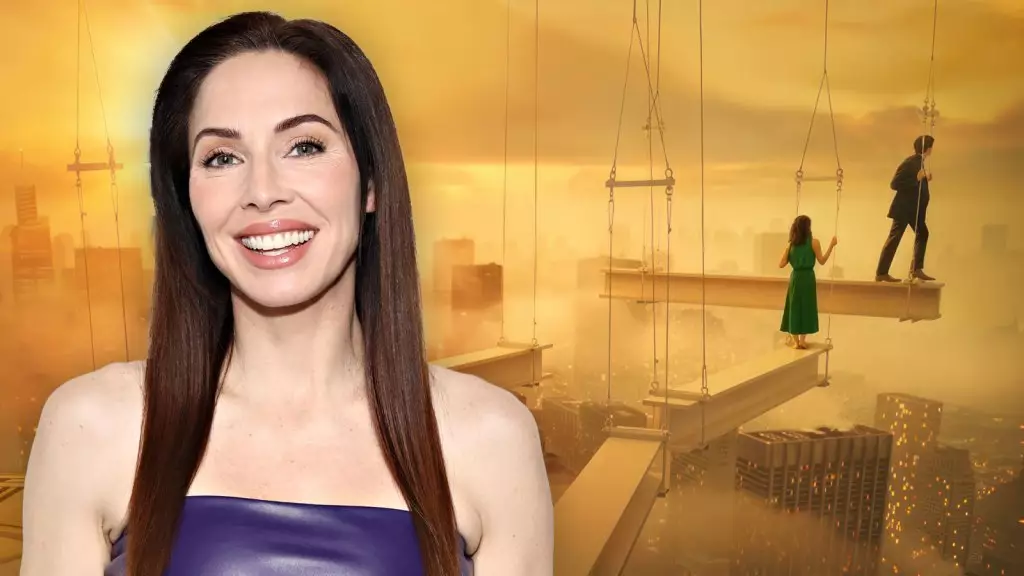In the world of entertainment, auditioning can often resemble a high-stakes game of chance where actors must put their best foot forward, not just in performance but in navigating the complex dynamics of the audition room. Whitney Cummings, a well-known comedian and host, recently unveiled a particularly harrowing experience she faced while auditioning for the legendary director Francis Ford Coppola’s ambitious project, “Megalopolis.” Through her candid recounting, Cummings sheds light on the multifaceted emotions actors endure during the audition process, illustrating the fine line between triumph and embarrassment.
Cummings vividly recalls entering the audition space only to be met with an atmosphere that felt decidedly off-putting. Instead of the typical banter that often accompanies casting calls—the usual pleasantries and warm greetings—Cummings described a silent room that seemed to envelop her in an unsettling air of awkwardness. The lack of energy led her to question the dynamics at play, turning what should have been a straightforward audition into an anxiety-inducing ordeal. Her verbal expression, featuring phrases like “no vibe,” captures the sense of disconnection she experienced. In the high-pressure context of performing for a titan like Coppola, such discomfort can amplify the fear of failure and vulnerability.
Actors are often challenged to stretch their limits, and Cummings faced a distinct test of her improvisational skills. Instead of a structured reading of the script as she anticipated, Coppola offered her a series of absurd prompts, which left her scrambling to adapt. This radical departure from traditional auditioning techniques highlighted not only Coppola’s creative approach but also Cummings’ bewilderment. She had expected to present her prepared lines and showcase her talent, yet instead found herself in a surreal landscape where she was tasked with bidding farewell to a son going off to war with an English accent or confronting her imaginary husband in an Australian accent.
This unconventional format can be daunting, challenging actors to perform on the fly. Cummings humorously noted her struggle with this improvisational format, suggesting that perhaps the wildness of the prompts could have warranted more structure. The cognitive dissonance she experienced is palpable; one could almost envision her internal dialogue spiraling into disbelief. It raises an essential question: at what point does the pressure of improvisation become overwhelming, pushing an actor to a place of disassociation rather than focused performance?
The culmination of Cummings’ audition experience was marked by a sense of profound embarrassment. After a series of bizarre prompts and an apparent lack of direction, she was left feeling as though she had just participated in a grand, theatrical disaster. Her assertion that she “disassociated” during the performance speaks volumes about the mental toll such experiences can take. The feeling of vulnerability is all too real; many actors can relate to the embarrassment of performing poorly, especially in front of prestigious filmmakers.
Cummings’ subsequent exchange with Coppola, which included the unexpected gift of a signed copy of his book and a bottle of wine, serves as both a gesture of goodwill and an unintended reminder of the disorienting audition experience. The contrast between Coppola’s attempt to connect and Cummings’ emotional turmoil showcases the complexities of this industry. It can almost feel cruel when a positive gesture is layered over a fundamentally disappointing experience.
Whitney Cummings’ experience in auditioning for “Megalopolis” underscores broader themes within the film industry about vulnerability, improvisation, and emotional resilience. It emphasizes that behind the glitz and glamor of Hollywood productions lies a human element often marred by anxiety and fear of inadequacy. While Cummings would ultimately navigate this challenging experience, her story serves as an important reminder that, in the art of auditioning, not every experience will be a triumph—but each moment contributes to an actor’s journey and growth. For many in the industry, these tales of adversity and embarrassment encapsulate the reality of chasing artistic dreams in a competitive arena.


Leave a Reply